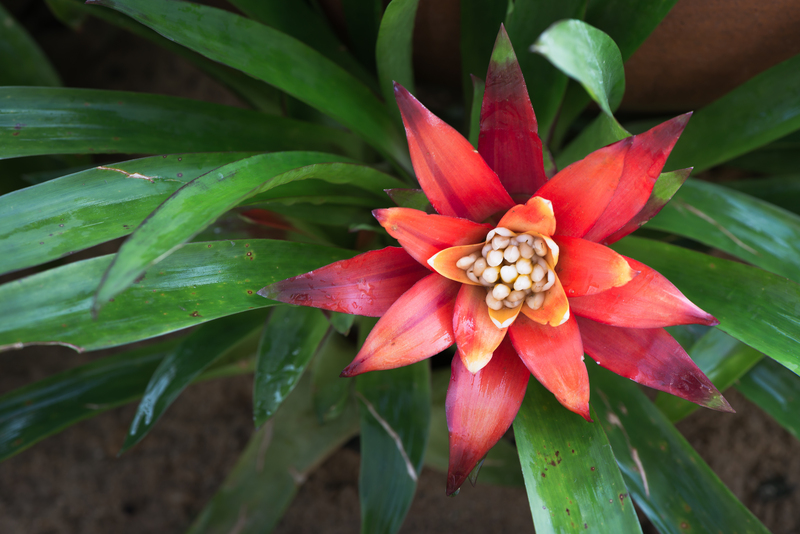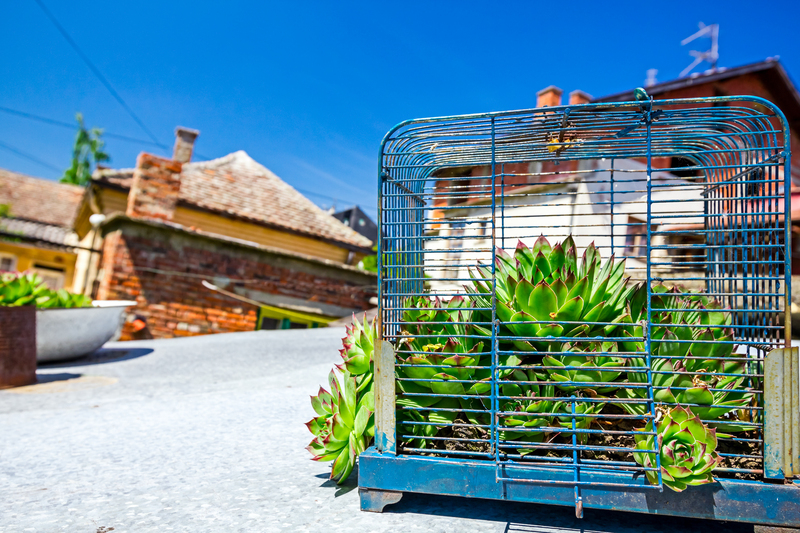Garden Your Way to a Healthier Planet
Posted on 29/06/2025
Garden Your Way to a Healthier Planet: A Comprehensive Guide
In today's rapidly changing world, the need for sustainable living practices has never been more critical. One incredibly impactful--and accessible--way to support our environment is through eco-friendly gardening. Whether you have sprawling acreage or a humble balcony, you can play a role in preserving our planet's health. Garden your way to a healthier planet by integrating green gardening principles that promote biodiversity, reduce carbon footprints, and revitalize local ecosystems. In this article, we'll explore the transformative power of gardening for planetary wellness and provide actionable tips for every aspiring eco-gardener.

Why Eco-Conscious Gardening Matters
At first glance, gardening might seem like a simple hobby, but its implications are profound. By choosing to garden for the planet, you're actively contributing to:
- Offsetting carbon emissions by planting trees and shrubs that absorb CO2
- Restoring biodiversity by providing food and shelter for pollinators and wildlife
- Building healthier soil that filters water and sequesters carbon
- Reducing waste through composting and organic practices
- Creating sustainable food sources that minimize the need for long-distance transportation
These benefits show that choosing to garden your way to a healthier planet can have ripple effects far beyond your own backyard.
Gardening and Climate Change
The role of gardening in combating climate change cannot be overstated. Plants naturally capture carbon dioxide through photosynthesis, serving as carbon sinks that help balance the atmosphere. When you replace lawn grass or paved areas with diverse plantings, you promote a richer, more robust ecosystem that fosters resilience in the face of climate challenges.
Urban gardening also helps lower the urban heat island effect by cooling the air, providing shade, and facilitating natural water absorption. Through conscious selection of native and drought-tolerant species, gardeners can further reduce water consumption and prevent the spread of invasive species.
Starting Your Eco-Friendly Garden
If you're inspired to start gardening for the planet, you're in luck: every effort counts, and you can begin at any scale. Follow these core principles to maximize the ecological benefits of your garden:
Choose Native and Pollinator-Friendly Plants
Native plants are the cornerstone of a healthy garden ecosystem. Because they evolved naturally in your region, these plants require less water, fertilizer, and maintenance. They also form symbiotic relationships with local pollinators--like bees, butterflies, and birds--enhancing local biodiversity.
- Research native plant species in your area through local extension offices or botanical gardens
- Group plants according to their sunlight and water needs
- Incorporate pollinator-friendly varieties like milkweed, coneflower, and lavender
Build Up Healthy, Organic Soil
Soil is alive--with billions of microorganisms working together to break down organic matter and supply plants with nutrients. Healthy soil captures more water and stores more carbon, making it a critical ally in the fight against climate change.
- Compost kitchen and yard waste to build rich, living soil
- Avoid chemical fertilizers and pesticides that damage beneficial microbes
- Try no-till gardening to protect the soil structure and minimize disruption
Practice Water-Wise Gardening
Droughts and water shortages are increasingly common due to climate change. Conserving water in your garden not only makes sense environmentally, but it also saves you money.
- Mulch garden beds to retain moisture and suppress weeds
- Collect rainwater in barrels for irrigation
- Install drip irrigation systems for more efficient watering
- Select drought-tolerant plants and group them based on their watering needs
Sustainable Gardening Techniques for a Greener Planet
Grow Your Own Food
Homegrown fruits, vegetables, and herbs are fresher, tastier, and far less resource-intensive than their supermarket counterparts. By cultivating your own produce, you reduce dependence on large-scale agriculture and long-haul food transport, both of which have a significant environmental impact.
- Start small with easy crops like lettuce, tomatoes, or herbs
- Rotate crops and use companion planting to reduce pests and boost soil fertility
- Share excess harvest with neighbors or local food banks to strengthen community food systems
Encourage Wildlife Habitat Creation
Every garden can become a wildlife sanctuary supporting birds, pollinators, and beneficial insects. By providing food, water, and shelter, you actively boost local biodiversity and help maintain crucial ecosystem services.
- Install birdhouses, bat boxes, or insect hotels
- Plant a variety of flowering species for sequential bloom times
- Leave some areas "wild," such as a pile of brush or unmown grasses, for sheltering wildlife
Minimize Chemical Inputs
Pesticides and synthetic fertilizers can wreak havoc on soil health, water quality, and non-target species. By adopting organic gardening principles, you protect both your garden and the wider environment.
- Use natural predators like ladybugs or nematodes for pest control
- Create homemade organic sprays when necessary (e.g., neem oil)
- Opt for integrated pest management techniques to keep problems in check without resorting to chemicals
Composting: Closing the Loop
Composting transforms kitchen scraps and garden waste into fertile, nutrient-rich soil. Not only does this reduce landfill waste and methane emissions, but it also provides your garden with sustainable, natural fertilizer. You can garden your way to a healthier planet by making compost a core part of your gardening routine.
- Keep a small bin for food scraps like vegetable peelings, coffee grounds, and eggshells
- Mix green material (wet, nitrogen-rich) with brown material (dry, carbon-rich) for optimal decomposition
- Avoid composting meat, dairy, or oils to prevent odors and pests
- Turn the pile regularly and keep it moist, not soggy
In only a few months, you'll have nutrient-rich compost to boost soil health and plant vitality.
Harnessing the Power of Community
While individual efforts are crucial, collective action has the potential for far greater impact. Community gardens, seed swaps, and local gardening clubs not only enhance environmental outcomes but also strengthen social bonds, promoting a culture of sustainability.
- Join or start a community garden to share resources and knowledge
- Participate in local planting days or cleanup events
- Advocate for green spaces, pollinator habitats, and edible landscapes in your neighborhood
Sustainable Gardening for All Spaces
You don't need a large plot to make a difference. Container gardening on patios, rooftop gardens, and vertical plantings all contribute to planetary well-being. Every plant you nurture--whether on a sunny windowsill or in a raised bed--makes a difference.
- Use recycled materials for planters and supports
- Grow herbs indoors to reduce food miles for flavorings and garnishes
- Create a pollinator window box with native blooms
Advanced Sustainable Gardening Practices
Permaculture Principles
Permaculture is a holistic approach to garden design, drawing inspiration from natural ecosystems. By applying permaculture principles, you can create gardens that are more resilient, productive, and beneficial for the planet.
- Design for diversity: Integrate multiple plant and animal species
- Capture and store energy by using solar or wind power for garden needs
- Plan for water capture via swales or rain gardens
Permaculture helps gardeners work with nature, not against it, turning gardens into thriving mini-ecosystems.
Organic Mulching and No-Plastic Gardening
Plastic is ubiquitous in gardening, but it doesn't have to be. Use organic mulch materials like wood chips, straw, or shredded leaves to suppress weeds, retain moisture, and gradually enrich the soil. No-plastic gardening means opting for biodegradable pots, reusable stakes, and other sustainable alternatives.
- Upcycle household items for starting seeds
- Purchase quality tools that can be repaired instead of replaced
- Support nurseries using sustainable growing practices and packaging

Measuring Your Impact: The Bigger Picture
Every garden is part of a global network of green spaces contributing to planetary health. While it may seem small, gardening's impact is cumulative:
- One mature tree can absorb approximately 48 pounds of carbon dioxide per year
- Pollinator-friendly gardens contribute to the food security and health of entire regions
- Organic gardening reduces the reliance on fossil-fuel-based fertilizers and pesticides
By tracking the wildlife in your garden, reducing waste, or measuring harvests grown organically, you can witness your environmental contribution firsthand.
Conclusion: Cultivating Hope for a Healthier Planet
When you garden your way to a healthier planet, you're not just growing vegetables or flowers--you're sowing seeds of positive change, resilience, and hope. Each action, no matter how small, fosters a world where humans and nature thrive together.
So, dig in. Embrace sustainable gardening, educate your neighbors, and watch as your efforts blossom into cleaner air, richer soils, thriving pollinators, and stronger communities. Together, we can nurture a healthier planet, one garden at a time.
Ready to start your eco-gardening journey?
- Assess your garden space and set sustainable goals
- Join local gardening groups for support and resources
- Continue learning to maximize your positive impact on the planet
Let's grow a greener future together--garden your way to a healthier planet!
Latest Posts
Mastering the Craft of Container Gardening
Eco-Friendly Gardening with Canine Companions
Advanced Techniques for Stunning Hedge Sculptures

